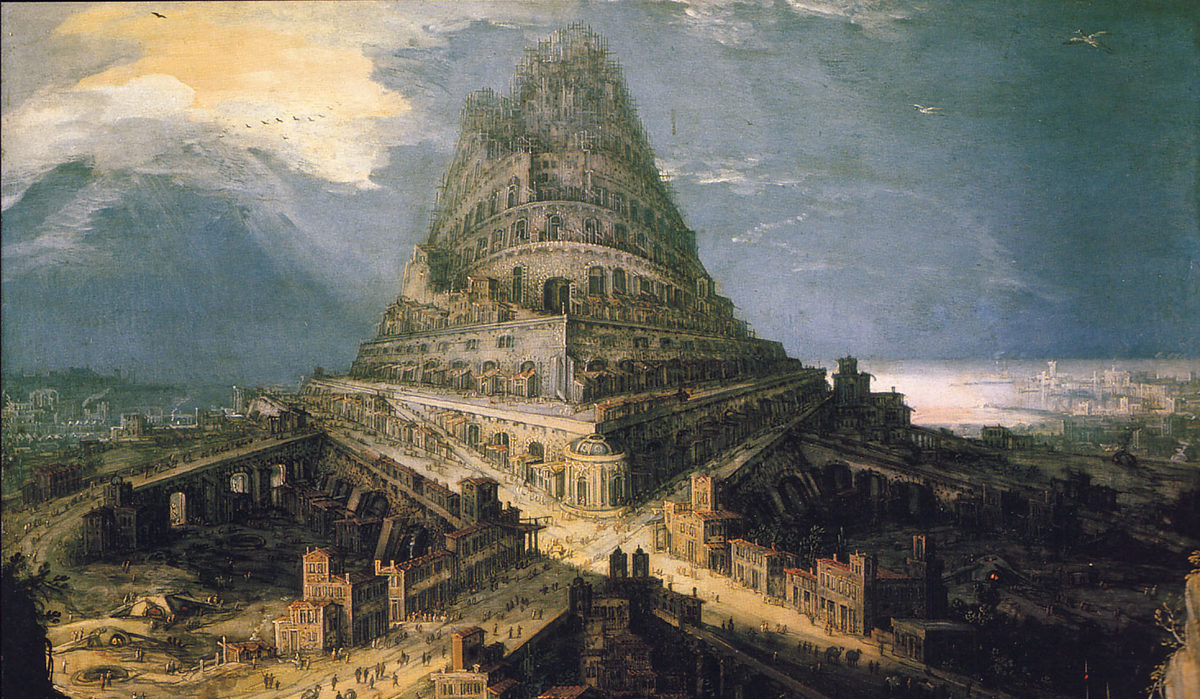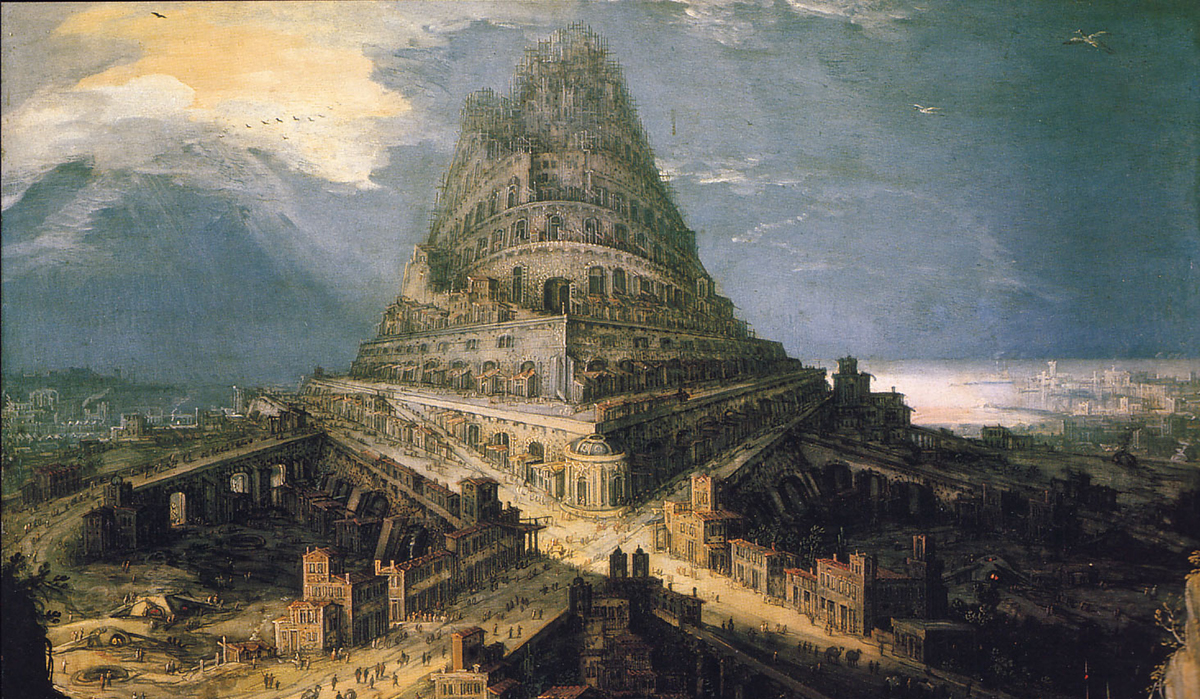Co-Missioners,
We are suddenly in the second half of the church year when Sundays are numbered after Pentecost and the unrelenting focus of the weekly Word is on the particular mission to our 21st century world that the Triune God used a first-century Pentecost to enmesh his church in. To refresh and whet your mission-minded thoughts, we pass along a Pentecost sermon that our editor, Jerry Burce, preached eleven days ago in a suburb of Cleveland, Ohio.
Peace and Joy,
The Crossing Community
A Pentecost Sermon
Core Text: Genesis 11:1-9
By Jerome Burce
This is an effort-insufficient as most all such efforts turn out to be-to jump from a Crossings-style text study to a Crossings-worthy sermon that can be delivered in fifteen minutes. The text study, “Monumental Intoxications,” was developed in 2010. Funny how so much has changed since then and yet so little. What continues is the babbling, ever louder, more strident, more portending of God’s wrath unleashed on a haughty world. Kyrie eleison. —JB
+ In the Name of Jesus +
The point of Pentecost is simple. God is not about to let the death of Jesus go to waste.
We all woke up this morning in a world that badly needs what Jesus died to accomplish. It’s an arrogant, self-serving world run by arrogant, self-serving people who in 2019 are as busy as our arrogant, self-serving ancestors were with the project we heard about a few minutes ago in that story from Genesis.
 Most of you know that story well, I think. We learned it in Sunday School. Some people are living on a plain at the far northwestern end of the Persian Gulf. They decide to build a city and a tower to go with it, a very tall tower with its top “in the heavens.” We have our own word today for towers like this. We call them skyscrapers. They do for us what that tower was supposed to do for those folks who tried to build it in that city called Babel. They give us bragging rights. They invite us to babble on about ourselves. Remember when the Sears Tower was still the Sears Tower and the tallest building in the world? I was in my 20s then. I remember feeling ever so quietly proud that the world’s tallest building was in my country, and not in somebody else’s. These days the tallest building ever is in Dubai, on the opposite side of the Persian Gulf from ancient Babel. It’s called the Burj Khalifa. It was opened for business in 2010. It’s over twice the height of the Empire State Building. Imagine that. I’ll bet the people who live in Dubai today feel very proud of this–in fact I know they do. I read a bit of the prose they use to describe their building on the internet. It sounds a lot like the prose we Americans used to use to talk about our building projects.
Most of you know that story well, I think. We learned it in Sunday School. Some people are living on a plain at the far northwestern end of the Persian Gulf. They decide to build a city and a tower to go with it, a very tall tower with its top “in the heavens.” We have our own word today for towers like this. We call them skyscrapers. They do for us what that tower was supposed to do for those folks who tried to build it in that city called Babel. They give us bragging rights. They invite us to babble on about ourselves. Remember when the Sears Tower was still the Sears Tower and the tallest building in the world? I was in my 20s then. I remember feeling ever so quietly proud that the world’s tallest building was in my country, and not in somebody else’s. These days the tallest building ever is in Dubai, on the opposite side of the Persian Gulf from ancient Babel. It’s called the Burj Khalifa. It was opened for business in 2010. It’s over twice the height of the Empire State Building. Imagine that. I’ll bet the people who live in Dubai today feel very proud of this–in fact I know they do. I read a bit of the prose they use to describe their building on the internet. It sounds a lot like the prose we Americans used to use to talk about our building projects.
 Not that Americans have given up on building, at least not altogether. Just last week I read an article about the changing skyline in New York City. What’s going up, it seems, are any number of super high condominium developments for the super wealthy. Now there’s a thrill for the lucky few: cocktails at sunset as you gaze out and down from your sky-high living room window on all those little people swarming like ants on the busy streets below. Talk about knowing that you, at least, have made it. I say this because that’s how I would feel if I were in a position to live in such a place, which I’m not, of course, and never will be. So instead I speak with scorn of those who could afford it, because that’s what sinners do. We always find a way to look down on each other—and God is not amused as we flaunt our stuff, however we do it. He never is.
Not that Americans have given up on building, at least not altogether. Just last week I read an article about the changing skyline in New York City. What’s going up, it seems, are any number of super high condominium developments for the super wealthy. Now there’s a thrill for the lucky few: cocktails at sunset as you gaze out and down from your sky-high living room window on all those little people swarming like ants on the busy streets below. Talk about knowing that you, at least, have made it. I say this because that’s how I would feel if I were in a position to live in such a place, which I’m not, of course, and never will be. So instead I speak with scorn of those who could afford it, because that’s what sinners do. We always find a way to look down on each other—and God is not amused as we flaunt our stuff, however we do it. He never is.
But back to the story in Genesis. It’s the attitude of the people involved that gets God’s dander up. Look closely at it later and see for yourselves how those people talk. “Come,” they say, “let us make bricks,” and again they say, “Come, let us build a city.” That’s how God talks back in Genesis 1 when he says, “Let us make man in our image.” It’s how God talks again at the end of today’s story when he says, “Come, let us go down and confuse their language so that they don’t understand each other.”
So notice what the issue is. It’s about people striving to push God off the stage and to grab God’s bragging rights as the One who runs the show and makes things happen. “Come,” the people say, “let us make a name for ourselves.” Let’s show the world that we are Babelites and they are not. There’s something scary about this. It sounds too much like the noises we’ve long been making in our own country. The ancient Romans talked like this too. So did the British in the 19th century when Britannia ruled the waves and made sure the world knew it.
This is an arrogance that God won’t tolerate—not forever, at any rate. Today’s Pentecost story is part of a longer story that St. Luke tells. Its theme gets set already in Luke 1, where a no-name back-country teenager named Mary sings these words: “God brings the mighty down from their thrones; God lifts up those who count for nothing.”
This is a project God is forever busy with, people being as people are and always will be until God is all done saving us from ourselves. What happens at Babel is a snapshot of God’s project Part 1. God brings the mighty down. At Babel he does it by making it impossible for those arrogant people to hear and understand each other. That gives me another chill. I can’t help but notice how we Americans are struggling so hard to hear and understand each other in 2019. We have one chief language, American English, but then there’s Red American English and Blue American English, or, as you could say, there’s Fox News English and MSNBC English, and try if you can to get speakers of each to agree on what a basic word like “liberty” might mean, especially when it comes to particular issues—guns, for example. Good luck with that. Does God have a finger in stirring this confusion? The story of what happened at Babel pushes us not just to imagine this, but to take it for granted. We are without question a haughty, arrogant people who deserve to be taken down—on that much we all agree; we say it about ourselves, we convict each other all the time: folks on the right when they think about universities, say, folks on the left when they think about corporate boardrooms. “Those people,” we say. “They’re at it again with their self-serving projects, their efforts to make a name for themselves at our expense. They’ve got to be taken down.” No wonder our politics have gotten so nasty and implacable.
After all, God who hears all things hears these things too that we say about each other—and God agrees with them. So says the Bible. The haughty are coming down.
+ + +
So back we come to Pentecost, this great day when God made sure that what God once did and is doing still in Christ Jesus will not go to waste in a world that needs it so badly.
You heard the story, of course, that great story of those no-name people in Jerusalem breaking through all kinds of language barriers to tell about “the mighty deeds of God” or “God’s deeds of power,” as today’s translation puts it.
God’s greatest deed of power ever was to bring a mighty one down from his high and lofty throne and place him in a manger and after that on a cross; and before he got there he spent a brief career rubbing elbows with the ant people–you know, those little creatures scurrying here and there on the face of the earth in their frantic efforts to stay alive for another day. Though even as I say this, I need to point out that Jesus spent a fair amount of time going to dinner with the upper class too. So says St. Luke, at any rate. The point is, God strangely loves us all, no matter who we are, or where we live, or what we deserve—or don’t deserve. What no one deserves is God’s gracious attention and help. God gives it anyway. And at no point did God give it more vividly than in that moment when Christ our Savior died with all the world, rich and poor alike, either laughing at him or despising him or flat out ignoring him as one of those countless creatures who deserves no attention.
What Jesus got when he died was God’s attention; God who made an everlasting name for Godself by raising this Jesus from the dead to save us all from our babbling madness.
 Another little baby is being baptized at Messiah this morning. We all hope the best for this baby, of course we do. What no one knows, least of all the parents, is how this baby’s life will unfold as she grows. Among other things, we don’t know who this baby will grow up to despise and look down on, though she’s bound to look down on somebody, we all do that—there’s not a one of us who doesn’t do it. Yet this baby gets to start her life with an absolute, unbreakable promise that God will never despise her. Each of us lives with that promise too. Each of us woke up this morning the way this baby will tomorrow morning, marked and stamped forever with the Name of Names, each of us forever free from the burden of having to make a name for ourselves, as if there’s any name that could be any better than the one God made for us to claim and enjoy when Jesus died.
Another little baby is being baptized at Messiah this morning. We all hope the best for this baby, of course we do. What no one knows, least of all the parents, is how this baby’s life will unfold as she grows. Among other things, we don’t know who this baby will grow up to despise and look down on, though she’s bound to look down on somebody, we all do that—there’s not a one of us who doesn’t do it. Yet this baby gets to start her life with an absolute, unbreakable promise that God will never despise her. Each of us lives with that promise too. Each of us woke up this morning the way this baby will tomorrow morning, marked and stamped forever with the Name of Names, each of us forever free from the burden of having to make a name for ourselves, as if there’s any name that could be any better than the one God made for us to claim and enjoy when Jesus died.
And with that name comes the gift and power of the Holy Spirit to believe it; to grasp with our hearts, to imagine with our minds, that that this Name of ours really is the Best and Greatest Ever. No other name beats it. No other name comes close. One of the things that makes this name so great is how widely it’s shared. It is stamped this very morning on people who woke up in penthouses and on people who woke up in prisons. Some live in suburbs, other in slums, still others in refugee camps without the faintest clue of where they belong, only that they belong to God. They too wear the name of Jesus.
Some who wear it speak English. Others speak Spanish. Some sound like this when they say the Lord’s Prayer: “Naimanya Takainge, ketae kaitinya katenge doko.” That’s “Our Father in heaven” in a language called Enga.
There’s this too, so important for our country today. Some who wear this name have a habit of voting Republican. Others vote Democrat. Let’s all remember that this morning, or better still this evening when the newsfeeds we prefer invite us once again to hate and despise those other people who have it all wrong and are trying to do us in. That sort of attitude simply isn’t worthy of the Name we bear in this place. Christ gave his life for rascals of every stripe, including the rascal that I am. We all know this. Those who wear his name with confidence and pride will insist on love where others scream for hate. They will love the haters whose hate they oppose, as the love of God compels them to do.
And that, finally, is what Pentecost is about in 2019: no-name people like you and me filled with the power of the Holy Spirit to grab and own the name of Jesus, and in that name to fill the world with the promise of God’s impossible love. This love is strong and true enough to forgive the worst of sins and to raise the dead. It’s rich and wide enough to wrap its arms around the least of human beings—the most despicable, even— and to call them saints, the holy ones of God in Jesus Christ. That’s who are, by the way.
Let’s remember this and practice it too as we go about our days this week. You are God’s Pentecost gift to an arrogant land that God is busy confounding—to a babbling people that God in Christ crucified continues so strangely to love, with you as his agents for passing this love along to others who need it as badly as we do.
+ To God Alone the Glory +
Thursday Theology: that the benefits of Christ be put to use
A publication of the Crossings Community





You must be logged in to post a comment.